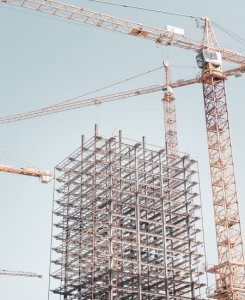- Construction
- Manufacturing
- Real Estate

Longer Reads
Supply Pain: Who is responsible for delays on luxury resi projects?
With many super-prime schemes being thrown into chaos by supply chain problems, Alexander Jullienne looks at where the responsibility for delay rests, and what contractors charged with sourcing bespoke materials should be factoring into their agreements…
Originally published in Prime Resi.
2 minute read
Published 28 July 2021
Key information
- Specialisms
- Real Estate
- Services
- Construction
- Manufacturing
- Real Estate
In high-value luxury developments and refurbishments where materials are often sourced internationally from exotic suppliers, there is often little flexibility available to contractors who are required to procure those materials under the terms of their building contract. Any hold up in the manufacture or delivery will have significant impact on the project given the contractor will need time to install those items, re-sequence its programme and reallocate its labour from other areas of the project.
Combine this with the contractor’s obligation to complete the construction works by the project completion date and agreement that it will carry out the works regularly and diligently, then situations can arise where the contractor, through no fault of its own, is in delay.
Together with the increasing uncertainty from Covid-19 and Brexit, which the construction industry is still coming to grips with, and the probability increases for any given project to be impacted by events the contractor has no control over.
The question that continues to pop up is who bears the associated risk of delay in a construction project caused by events that are, more often than not, outside of the contractor’s control?
As always, and rather unhelpfully, the answer will depend on the wording of the contract and an examination of the facts and events specific to that project. Consideration of these questions will show who bears the risk of the delay event which is hindering or preventing progress of the project.
Often, a delay event might provide relief to the contractor for the time to complete the work but will not entitle them to claim additional costs. Close examination of the wording on the contract and the delay event itself will determine whether the parties have allocated risk on a delay event or whether that event was reasonably foreseeable at the time the contract was entered into.
Take a simple example where a project is seeing huge delay because of the lack of availability of materials caused by a hold-up down the contractor’s supply chain.
If the employer and contractor have not accounted for this event and allocated the risk of it, then it will be the contractor who bears the risk of that delay. This is because the contractor has agreed to complete the construction works for the agreed price by the agreed time. It is bound by the bargain it agreed to and if there is no scope to claim an extension of time for the completion date for delays that occur in its supply chain, then unfortunately, it will have to bear the cost and may be on the receiving end from the employer of a claim for liquidated damages. A situation may arise where the contractor is in delay, through no fault of its own, and has to defend claims from its employer for liquidated damages for delayed completion.
Alternatively, if the employer has expressly specified that the materials are to be sourced from that specific supplier which is holding up the supply chain, then the contract may entitle the contractor to an extension of time given it was the employer’s decision to source materials from that specific supplier.
If the contractor is seeking to claim an extension of time, then it will need to establish that that event has caused the delay to the progress of the works and many building contracts require the contractor to use “best endeavours” to mitigate any delay when facing a delay event.
Whilst parties already under contract will still be bound by the terms of their contract, contractors looking to avoid similar situations should at the outset and prior to entering the contract look to include provisions which provide them with an entitlement to an extension of time and/or costs for events such as delays in the supply chain caused by employer specified suppliers and/or Covid-19.
However, given Covid-19 and Brexit are events outside both parties’ control and which will now be known to both parties, it is unlikely an employer will be willing to bear the cost of delays caused by these events.
Related content
Longer Reads
Supply Pain: Who is responsible for delays on luxury resi projects?
With many super-prime schemes being thrown into chaos by supply chain problems, Alexander Jullienne looks at where the responsibility for delay rests, and what contractors charged with sourcing bespoke materials should be factoring into their agreements…
Originally published in Prime Resi.
Published 28 July 2021
Associated sectors / services
In high-value luxury developments and refurbishments where materials are often sourced internationally from exotic suppliers, there is often little flexibility available to contractors who are required to procure those materials under the terms of their building contract. Any hold up in the manufacture or delivery will have significant impact on the project given the contractor will need time to install those items, re-sequence its programme and reallocate its labour from other areas of the project.
Combine this with the contractor’s obligation to complete the construction works by the project completion date and agreement that it will carry out the works regularly and diligently, then situations can arise where the contractor, through no fault of its own, is in delay.
Together with the increasing uncertainty from Covid-19 and Brexit, which the construction industry is still coming to grips with, and the probability increases for any given project to be impacted by events the contractor has no control over.
The question that continues to pop up is who bears the associated risk of delay in a construction project caused by events that are, more often than not, outside of the contractor’s control?
As always, and rather unhelpfully, the answer will depend on the wording of the contract and an examination of the facts and events specific to that project. Consideration of these questions will show who bears the risk of the delay event which is hindering or preventing progress of the project.
Often, a delay event might provide relief to the contractor for the time to complete the work but will not entitle them to claim additional costs. Close examination of the wording on the contract and the delay event itself will determine whether the parties have allocated risk on a delay event or whether that event was reasonably foreseeable at the time the contract was entered into.
Take a simple example where a project is seeing huge delay because of the lack of availability of materials caused by a hold-up down the contractor’s supply chain.
If the employer and contractor have not accounted for this event and allocated the risk of it, then it will be the contractor who bears the risk of that delay. This is because the contractor has agreed to complete the construction works for the agreed price by the agreed time. It is bound by the bargain it agreed to and if there is no scope to claim an extension of time for the completion date for delays that occur in its supply chain, then unfortunately, it will have to bear the cost and may be on the receiving end from the employer of a claim for liquidated damages. A situation may arise where the contractor is in delay, through no fault of its own, and has to defend claims from its employer for liquidated damages for delayed completion.
Alternatively, if the employer has expressly specified that the materials are to be sourced from that specific supplier which is holding up the supply chain, then the contract may entitle the contractor to an extension of time given it was the employer’s decision to source materials from that specific supplier.
If the contractor is seeking to claim an extension of time, then it will need to establish that that event has caused the delay to the progress of the works and many building contracts require the contractor to use “best endeavours” to mitigate any delay when facing a delay event.
Whilst parties already under contract will still be bound by the terms of their contract, contractors looking to avoid similar situations should at the outset and prior to entering the contract look to include provisions which provide them with an entitlement to an extension of time and/or costs for events such as delays in the supply chain caused by employer specified suppliers and/or Covid-19.
However, given Covid-19 and Brexit are events outside both parties’ control and which will now be known to both parties, it is unlikely an employer will be willing to bear the cost of delays caused by these events.
Associated sectors / services
- Construction
- Manufacturing
- Real Estate
Need some more information? Make an enquiry below.
Enjoy reading our articles? why not subscribe to notifications so you’ll never miss one?
Subscribe to our articlesMessage us on WhatsApp (calling not available)
Please note that Collyer Bristow provides this service during office hours for general information and enquiries only and that no legal or other professional advice will be provided over the WhatsApp platform. Please also note that if you choose to use this platform your personal data is likely to be processed outside the UK and EEA, including in the US. Appropriate legal or other professional opinion should be taken before taking or omitting to take any action in respect of any specific problem. Collyer Bristow LLP accepts no liability for any loss or damage which may arise from reliance on information provided. All information will be deleted immediately upon completion of a conversation.
Close


































































